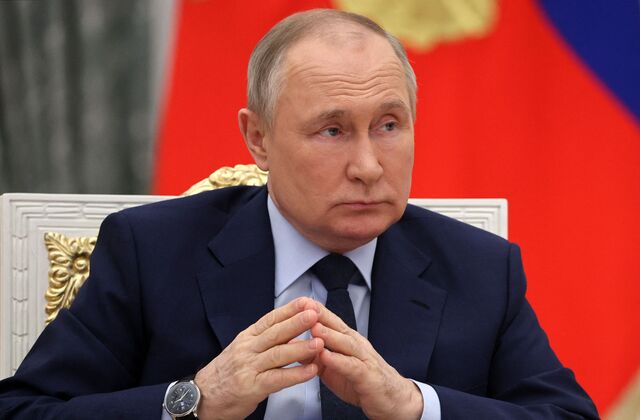Putin in Ukraine, fighting apostasy

by Lev Tsitrin
The New York Times‘ Roger Cohen — the paper’s long-time columnist and now its Paris correspondent — traveled recently the length and breadth of Russia to give us a long and thorough study of the mysterious Russian soul in the age of Ukraine war. Mr. Cohen talked to die-in-the-wool working-class Putin supporters, with Russian government officials, with the opposition figures — and the gist seems to be, “Our values are different. For Russians, freedom and economic factors are secondary to the integrity of our state and the safeguarding of the Russian world” — as per one “Pyotr Tolstoy, a deputy chairman of the State Duma and a direct descendant of the great novelist Leo Tolstoy.
“Safeguarding” seems to be the key word here; as a car mechanic who was wounded in the storming of Mariupol and now lives in Russia’s far east explained to Mr. Cohen, “10th-century Kievan Rus — comprising territory that partially overlapped with today’s Ukraine — was the birthplace of modern Russia and the region has always constituted the inalienable borderlands of greater Russia. Russia and Ukraine are “one body,” [that has] a tumor — it is in Ukraine, and we have to cure it, The tumor comes from Americans who go places they have no need to go.”
According to this view, the problem is Ukraine’s demand for real independence (rather than acquiescence to the nominal “independence” a la Belarus’). Allowing Ukrainians to choose their alliances would violate Russia’s territorial integrity. Ukraine’s freedom is Russia’s dissolution.
This, in essence, is also the argument of those in the West who claim that the Ukraine war was caused by the expansion of NATO — to which Russia, in their view, reasonably reacted by invading Ukraine to shield itself from the encroaching threat.
Well, this is utter hogwash. Consider, for starters, a rather unusual place: Bill Clinton confessing that “he regrets pressuring Ukraine to give up its nuclear warheads in a high-stakes negotiation in 1994. … He said he believed that Russia would not have invaded Ukraine in 2014, and in 2022, had the weapons still been in the country.”
Why not? Because it is very dangerous indeed to attack a nuclear-armed state, so have Ukraine retained its nuclear arsenal (third-largest in the world, after US and Russia), Putin would have hardly dared to attack. Now,, replace “Russia” with “NATO”, and “Ukraine” with “Russia” — and the question now becomes, would NATO dare attack Russia? The answer is an obvious “no.” NATO, in any territorial configuration, would not attack Russia, because Russia is nuclear-armed. And (and this is the key to understanding Putin’s war on Ukraine) — the opposite is also true: Russia cannot dare to attack NATO, which is nuclear-armed too.
NATO membership is thus the line of ultimate escape from Russia’s brotherly embrace — and signifies the moment of irrevocable independence from Russia, an escapee being past recapture. Naturally, for the person for whom restoration of the pre-1917 Russian Empire (which, for those who forgot, included Poland, Finland, and the Baltic republics too) is the historical life mission, Ukraine’s potential escape beyond the NATO border represents the ultimate danger — not the danger to the present Russian state of course (it is perfectly safe behind the wall of some 6,000 nuclear warheads), but to the Russian state as it ought to be in Mr. Putin’s mind. So, to Mr. Putin, it was “now or never” — he had to act before Ukraine became a NATO member. Else, goodby Russia’s imperial glory!
The motivator here, I think, is best described by the notion of apostasy. Apparently, apostasy is abhorred not just by Moslems (for whom it is a capital crime), but by Russian nationalists too. To them, what was once part of imperial Russia must always remain the part of Russia. Mr. Cohen put is somewhat differently — “Mr. Putin’s rule is all about the reconstitution of this imagined Russian world, or “Russkiy mir,” a revanchist myth built around the idea of an eternal Russian cultural and imperial sphere of which Ukraine — its decision to become an independent state never forgiven — is an integral part” — but given the mystical light in which Putin and Putinists see Russia’s universal mission to promote the good, and combat the evil (that is incarnated in Western freedoms), the religious motivation explains him best. He fights apostasy that Ukraine represents — and to defeat it, he went to war — “a civilizational conflict with the West far larger than Ukraine,” as subtitle to Mr. Cohen’s piece put it.
It is a passable subtitle — but “Putin’s war on apostasy” would have put it much better, it seems to me. And infinitely better than the New York Times-assigned title, “Putin’s Forever War“